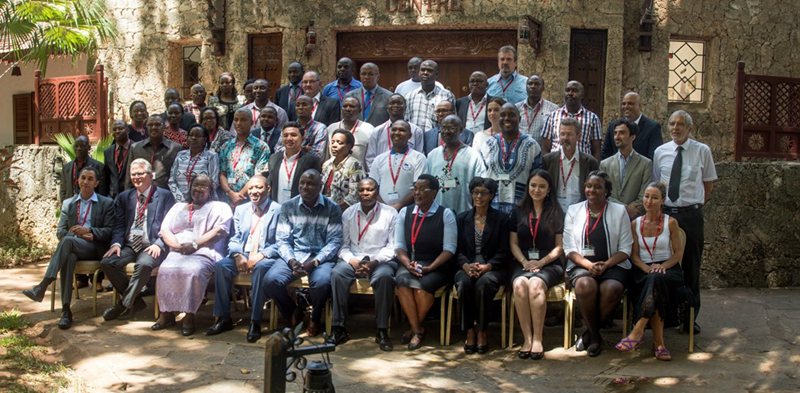
On 23 and 24 November 2016 a High Level Stakeholders seminar was conducted in Mombasa, Kenya. The aim was that the partnerships formed at the meeting will drive the FishFORCE project in each country (South Africa, Mozambique, Tanzania, Kenya, Somalia and Indonesia) and to facilitate cross border training and post-training support co-operation.
The NMMU was represented by Prof Derrick Swartz, Prof Hennie van As and Megan Skei from the Centre for Law in Action as well as contracted staff, namely Emma Witbooi, JD Kotze and Adv Phil Snijman.
The Kenyan Minister for Agriculture, Livestock & Fisheries, Mr Willy Bett and the Principal Secretary of the State Department of Fisheries and the Blue Economy also attended. Other attendees included senior representatives from Mozambique, Tanzania, Indonesia, Somalia and Mauritius.
The DVC: Academic of the University of Nairobi was also in attendance and an MOU will be concluded between the NMMU and the University of Nairobi.
At the conclusion of the seminar, a concept statement was issued.
Concept statement
Yesterday and today we have deliberated on the suitability of the FishFORCE model, consisting of training, post-training support and research and evaluation, as a model to address organised fisheries crime in the Indian Ocean Rim. The model is further based on a move away from ad hoc training to the offering of formal, university accredited training programmes that address the needs of its clients, namely all the role players in the criminal justice system. It is premised on the principle that knowledge and expertise should be shared and that, as far as possible, universities should collaborate with one another as well as with government agencies.
In South Africa the concept receives the support of Operation Phakisa and as such, the support of Government. In order to take the initiative forward interested partners resolve to:
-
Establish country specific chapters (reference groups) which will, with assistance of the NMMU’s FishFORCE Academy develop curriculum and harness existing local expertise to ensure that the Academy is technically relevant in the particular partner country.
-
Provide the name and contact particulars of a focal point with whom the FishFORCE Academy can liaise to drive the project.
-
In the development of the curricula, liaise with the Core Reference Group to ensure that international expertise and research feed into the curriculum and to act as a quality assurance instrument.
-
Assist the FishFORCE Project Management Team to facilitate a training needs assessment; assist with information gathering to conduct research and evaluation of fisheries law enforcement efforts.
-
Endeavour to commit to the implementation of the FishFORCE Academy within their jurisdiction and to identify mid-level directors and experts of key agencies and institutions to serve on the country reference groups.
-
Establish a regional body of training institutions to coordinate and support the delivery of training programmes developed to combat fisheries crime.

Proudly supported by:

The Southern African Development Community (SADC) Secretariat is the body that facilitates the implementation of SADC programmes and activities to meet its objectives and overall goal of poverty eradication and regional integration.

The legal mandate and core business of the Department of Forestry, Fisheries and the Environment (DFFE) are to manage, protect and conserve South Africa’s environment and natural resources. The mandate is informed by section 24 of the Constitution of the Republic of South Africa, 1996 (Act No. 108 of 1996), which affords everyone the right to (a) an environment that is not harmful to their health or well-being; and (b) to have the environment protected for the benefit of present and future generations, through reasonable legislative and other measures.

Operation Phakisa is an initiative of the South African government. This initiative was designed to fast track the implementation of solutions on critical development issues. This is a unique initiative to address issues highlighted in the National Development Plan (NDP) 2030 such as poverty, unemployment and inequality. It is a cross-sector programme where various stakeholders engage to implement initiatives and concrete actions to address constraints to delivery in a prioritised focused area for public accountability and transparency.

Stop Illegal Fishing is an independent African based Not for Profit organisation committed to ending the devastating impacts of illegal fishing. Dedicated to working in partnership with governments, civil society, NGOs, intergovernmental organizations and the fishing industry Stop Illegal Fishing is harnessing the necessary international support and growing African commitment to achieve positive change.

The Education for Justice (E4J) initiative seeks to prevent crime and promote a culture of lawfulness through education activities designed for primary, secondary and tertiary levels. These activities help educators teach the next generation to better understand and address problems that can undermine the rule of law and encourage students to actively engage in their communities and future professions in this regard. A set of products and activities for the primary and secondary levels have been developed in partnership with UNESCO.

The One Ocean Hub is an international programme of research for sustainable development, working to promote fair and inclusive decision-making for a healthy ocean whereby people and the planet flourish.